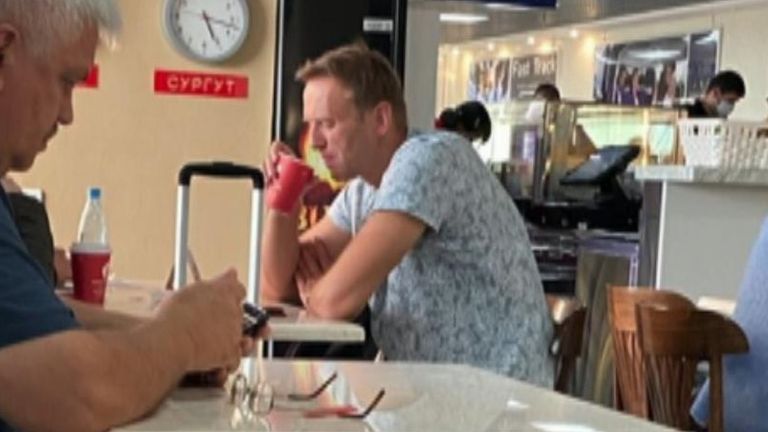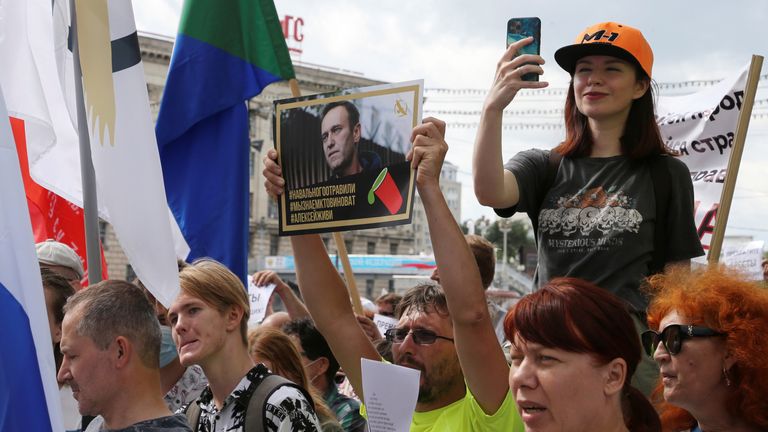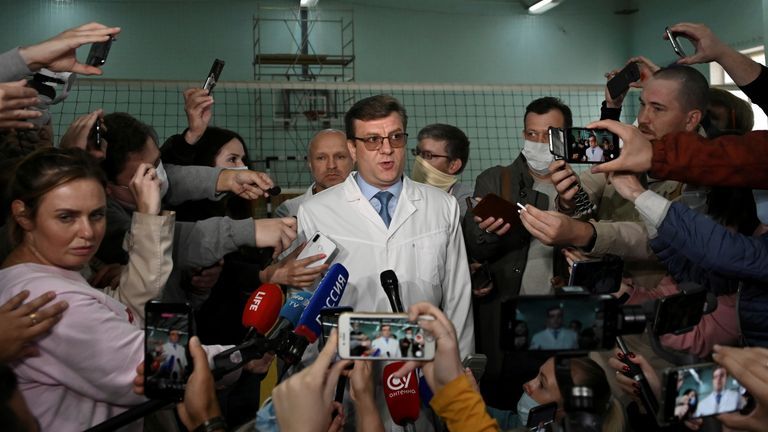Disposing of Critics
Disposing of Critics
![Plane carrying Russian politician Alexei Navalny lands in Germany Medical specialists carry Russian opposition leader Alexei Navalny on a stretcher into an ambulance on their way to an airport before his medical evacuation to Germany [Alexey Malgavko/ Reuters]](https://www.aljazeera.com/mritems/imagecache/mbdxxlarge/mritems/Images/2020/8/22/0c3401b879844ad19570195f1278fee9_18.jpg) |
| Medical specialists carry Russian opposition leader Alexei Navalny on a stretcher into an ambulance on their way to an airport before his medical evacuation to Germany [Alexey Malgavko/ Reuters] |
"Tests were immediately taken for the presence of toxic substances in the body. Already today we can say that oxybutyrates, barbiturates, strychnine, convulsive or synthetic poisons have not been found. Alcohol and caffeine were found in the urine."
Omsk regional health ministry"So clearly, being an outspoken opposition leader or being a corruption fighter or a whistle-blower in Russia is a dangerous business indeed." "Navalny was doing a lot of work exposing corruption, including at the highest level … and this is what they do to retaliate against their critics." Ariel Cohen, senior fellow, Atlantic Council
"He survived the flight and he's stable. It's obvious that something terrible happened. He's a healthy, strong man with a good constitution -- the night before the attack he was swimming in a river." "Obviously this was an attack on his life ... A healthy man suddenly was in life danger and maybe could have died and maybe he can still die." Jaka Ibzili, German organization Cinema For Peace
"It takes a while to rule things out. And particularly if something is highly toxic — it will be there in very low concentrations, and many screening tests would just not pick that substance up." Alastair Hay, emeritus professor, toxicology expert, school of medicine, University of Leeds
 |
| Mr Navalny is on a ventilator after drinking what is thought to have been poisoned tea. Pic: @djpavlin |
A standoff between doctors and allies of Kremlin critic Alexei Navalny came to a head on Friday when official clearance was granted for his transfer to a Berlin hospital from the Omsk Emergency Hospital where he was being treated after collapsing and falling into a coma on a routine flight from Siberia to Moscow. It is assumed that he was poisoned, a not-incongruent method frequently used to silence critics of the Kremlin and of Vladimir Putin, and possibly the second time poison was used on Mr. Navalny himself who survived the first attempt and may this one as well.
Others have been less fortunate. Conflicting accounts on Mr. Navalny's condition and whether he might be taken aboard a specially outfitted German medical evacuation flight waiting to receive him at the Omsk airport were eventually concluded. Omsk Emergency Hospital chief physician, Alexander Murakhovsky early on Friday said the patient's state of health mandated he not be moved, but hours later he reversed himself, saying transfer to German care could proceed.
 |
| Anti-Kremlins: 'Navalny was poisoned. We know who is guilty. Alexei, live' |
Dr.Murakhovsky also stated that no indication presented itself that Mr. Navalny had been a victim of poisoning, despite that he had said earlier it would take two days before laboratory results would be received. Those speaking for Mr. Navalny were under no illusions that he hadn't been a poisoning target, the most recent victim of state-ordered poisoning. His condition had improved from Thursday when he had been stricken, but no details were available from attending doctors.
The human rights activist Jaka Bizilj's Cinema for Peace Foundation was eager to leave Saturday with the patient on a chartered ambulance aircraft, for Berlin. When it arrived in Omsk Friday, three German physicians were aboard who eventually were permitted to examine Mr. Navalny. The German doctors were made unavailable -- forcibly escorted elsewhere by Russian authorities -- for their conclusions to be shared with Yulia Navalnava, Mr. Navalny's wife, nor with his colleagues; all blocked from speaking with them.
As far as Mr. Navalny's spokeswoman Kira Yarmysh was concerned, Russian doctors were guilty of endangering the stricken man's life by prolonging his Omsk Hospital stay rather than assent to his immediate departure for Berlin, as a reflection of their intentions to hinder an investigation "until the poison in his body can no longer be traced". She charged that "The ban on transporting Navalny is an attempt on his life, which is now being carried out by the doctors and the deceitful authorities who sanctioned it."
 |
| Doctors in Omsk hospital said there was no trace of poison in Mr Navalny's body Sky News |
Doctors at his hospital, said Dr.Murakhovsky, were possessed of "five working diagnoses", without divulging any details. The most likely cause of the coma that Mr. Navalny fell into, he later stated is "a metabolic disorder caused by a sharp drop in blood sugar levels during the flight [from Siberia to Moscow, which was aborted when Mr. Navalny fell suddenly ill]." Transportation police, on the other hand, had informed a Navalny associate, Ivan Zhdanov, that they had discovered poison deemed a danger not only to Mr. Navalny but anyone else close to him, meaning access to Navalny not be permitted without the protection of a full haz-mat suit.
The explanation proffered by the Omsk physicians was an industrial chemical substance found on Mr. Navalny's clothing, denying that the chemical poisoned Mr. Navalny. Mr. Navalny's enemies are those of whom he has been ultra critical; his Anti-Corruption Foundation served to expose excesses and corruption carried out by members of Russia's elite, enriched through their Kremlin connections.
"The plane with Alexei has taken off for Berlin. A huge thank you to everyone for your support." "The struggle for Alexei's life and health is just beginning and there will be much more to go through, but at least now the first step has been taken." Kira Yarmysh
 |
| The emergency medical plane transporting Mr Navalny lands at the Tegel airport in Berlin |
Labels: Political Challenges, Rule of Law, Russia
Labels: Critics, Doctors, Poisoning, Punishment, Putin, Russia

0 Comments:
Post a Comment
<< Home